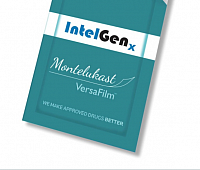Alzheimers research with Dr Aigner and team
[Jan 2021] I first read in January 2016 in The Guardian on line about Dr Ludwig Aigner's research in Austria using animal models to test the effects of montelukast on brain aging.
The main points that I got from his research were that:
1. Montelukast blocks cysteine leukotrienes from entering at certain cell receptor sites, which prevents these molecules from signaling for the production of inflammatory substances inside the cells.
2. Cysteine leukotrienes make the blood brain barrier (BBB) more permeable. Therefore blocking leukotrienes makes the weakened BBB stronger. A weakened BBB is a characteristic of Alzheimers and age related dementias.
3. The older laboratory rats improved in their mental obstacle tests, indicating the possibility that this drug could slow down or reverse the brain aging process in humans.
4. There was new neuron growth in certain parts of the aging lab animals brains, which lead to asking if taking montelukast could also make this happen in humans.
I read more articles on Dr Aigner's research, which led me to start taking this drug in February 2016 for my extreme mental fatigue. I went from one 10 mg tablet a day (small improvement) to one tablet twice a day (big improvement) to one tablet three times a day (completely back to normal) and I have taking three a day for more than four years. I am lucky that a prescription is not required for this drug in the country where I now live. September 2020
The Guardian article
https://www.theguardian.com/science/2016/jan/08/alzheimers-treatment-closer-as-brain-inflammation-shown-to-be-key
The Alzforum research news report https://www.alzforum.org/news/research-news/asthma-drug-revitalizes-memory-old-rodent-brains
Full research report in Nature Communications https://www.nature.com/articles/ncomms9466
Professor Rubinstein's research and audio interview
[Mar 2021] A few months after Dr Aigner published his research, Professor Menachem Rubinstein at the Weizmann Institute of Science in Israel published his research in Nature Communications in December 2015. His team did research on the Mgst2 gene, which becomes activated when cells are under stress. This activation leads to the creation of a small molecule called leukotriene C4, which triggers the production of reactive oxygen molecules that damage DNA, ultimately killing the cells.
The following article goes on to say that leukotriene blocking drugs are already available and include montelukast. In the brain leukotrienes are produced by the microglia, and he says that montelukast should be investigated for the prevention and treatment of Alzheimers and dementia. September 2020
https://wis-wander.weizmann.ac.il/life-sciences/discovery-new-switch-cell-death
An audio of Professor Rubinstein is available. He is being interviewed by Dr Norman Swan MD on Australian radio, and they discuss the Alzheimer- leukotriene connection, and the possibility that montelukast could be an effective treatment.
Dr Rozin and his small Alzheimers study
[Jun 2021] Since 2013, Dr Spencer Rozin, MD, an internal medicine physician in Lawrenceville, GA, has been prescribing this drug for Alzheimers and dementia patients. Dr Rozin conducted a study of treating a group of his patients with montelukast. In 2017, his study on montelukast was published by the National Institute of Health, which included a summary of case studies of 17 patients with various stages of dementia treated with montelukast. Sixteen patients showed improvement in either memory, or decrease in anxiety and agitation, or both. In other words, 94 percent of the patients gained some improvement with montelukast. The patients' dosage was 80 mg per day. Based on my experience, this dosage may be higher than necessary. I am taking 30 mg a day and I am completely back to normal. The asthma recommended dosage of 10 mg a day appears to be too low to make a big difference in Alzheimers.
Dr Rozin's published study
https://www.ncbi.nlm.nih.gov/pmc/articles/PMC5420184/
Dr Rozin's website:
http://drrozin.com
It is interesting to note that Jack Schulz, also residing at Lawenceville, was awarded a U.S. patent for designing a montelukast time release tablet to treat Alzheimers and other age related dementias. A number of cases in Dr Rozin's study were a part of his patent application, so evidently, they were working together.
montelukast sustained release capsule
https://patents.justia.com/inventor/jack-william-schultz
Dr Rozin's Lawrenceville office is in the metro Atlanta area and it seems likely that Dr Rozin's success in treating Alzheimers patients influenced Emory University to invest millions of dollars of research money into its montelukast Alzheimers trial. Since montelukast is now a generic, the trial is not being sponsored by a pharmaceutical company. September 2020
Integenx begins montelukast Alzheimers trial
[Jul 2021] I first began reading in 2016 about Intelgenx, the Canadian medical technology company which was seeking to run a clinical trial using montelukast to treat Alzheimers patients. The chairman of the board, Dr Horst Zerbe, is a renowned scientist with a number of patents for drug delivery systems. He was working with Dr Aigner to start a trial using their patented oral film strips to deliver montelukast to patients.
Their film strip product has three main advantages over montelukast tablets.
1. A high percentage of the drug would be absorbed from inside the mouth directly into the bloodstream, thus making an early bypass of the liver and preventing some drug loss.
2. Many Alzheimers patients have difficulty swallowing. Since oral film strips melts in the mouth, swallowing would be less of a problem.
3. Manufacturing montelukast using film strip technology allows Intelgenx to get a patent on their product, which is very important for making money on a generic drug.
In December 2017, Intelgenx received clearance from Health Canada, the Canadian government agency overseeing clinical trials, to begin a phase 2 study on mild to moderate Alzheimers patients. In January 2018, their phase 2 trial was posted on clinicaltrials.gov and it was in recruitment status.
In October 2019, Health Canada announced that they had found no safety concerns and approved continuing that trial. Also around that time period, it was announced that Intelgenx has plans to increase dosages, subject to Health Canada approval. They also announced that they are seeking FDA approval for their trial.
In April 2020 Intelgenx put the clinical trial on hold because of the Covid-19 pandemic. The trial restarted in 2022 and is expected to be completed in April 2024.
Intelgenx montelukast clinical trial
https://clinicaltrials.gov/ct2/show/NCT03402503
Alzheimers clinical trials - Emory vs Intelgenx
[Aug 2021] There are two government supervised clinical trials being conducted using montelukast as a treatment for Alzheimers. The Canadian trial is sponsored by Intelgenx, a medical technology company, with oversight by Health Canada, a Canadian government agency. The other trial is being sponsored Emory University, Atlanta, Georgia, USA with FDA oversight.
If you compare the Emory trial and Intelgenx trial, Emory has a more comprehensive trial, with more patients and more medical tests, including neuroimaging. Emory has vast experience in conducting FDA clinical trials and it has a lot of available federal grant money for Alzheimers research. Intelgenx started a year earlier but progress has been slow because it is very costly for a small company to pay for an expensive government supervised clinical trial.
Here is my comparison between the two trials:
Emory enrollment is 150 patients. For the Intelgenx Canadian trial, it is 70.
Emory will administer various mental and psychological tests at various intervals, as will the Canadian trial.
Emory will measure amyloid and tau at the beginning and after 12 months of the trial. They will also do neuroimaging This will not be done in the Canadian trial.
Emory will administer additional lab tests for safety at higher doses, which will not be required in the Canadian trial.
Most importantly Emory will dose patients up to 40 mg per day, whereas the Canadian trial is limited to 10 mg a day, which is the current FDA approved dosage for asthma prevention. Intelgenx is applying with Health Canada to increase the dosage.
Emory university trial https://clinicaltrials.gov/ct2/show/NCT03991988
https://news.emory.edu/stories/2019/10/nia_alzheimers_grant/
Parkinsons and Lewy Body Dementia
[Sep 2021] I first read in January 2016 on line in The Guardian about Dr Ludwig Aigner's research in Austria using montelukast to treat animal models of Alzheimers..
The main points that I got from his research was that montelukast blocks leukotrienes, which are signaling molecules that increase inflammation. Also montelukast strengthens the blood-brain-barrier (BBB) by preventing leukotrienes from making the BBB more permeable.
Since Dr Aigner's Alzheimers research in 2015, there have been other research with montelukast for Parkinsons Disease and Lewy Body Dementia. Both diseases have similarities with Alzheimers in that there is increased neuroinflammation and weak blood-brain-barriers, conditions that montelukast is able to treat.
Lewy body dementia
https://alz-journals.onlinelibrary.wiley.com/doi/10.1016/j.jalz.2017.06.233
Parkinson disease
https://pubmed.ncbi.nlm.nih.gov/28178069/
Dr Aigner's research led to the montelukast Alzheimers clinical trial by Intelgenx in Canada started in 2018, and later the Emory University montelukast Alzheimers trial in Atlanta, Georgia begun in September 2019.
Although both trials have been put on hold because of Covid-19, I expect that they should be getting positive results in 2021 and get FDA approval for Alzheimers at higher doses up to 40 mg a day. Once there is FDA approval, physicians can start using montelukast for Alzheimers as well as off label for Parkinsons and Lewy Body Dementias. I believe it will a standard treatment for age-related dementias within a few years.
Montelukast as a preventive for heart disease and stroke
[Nov 2021] The following study was done on a large population taking montelukast for asthma, which showed a reduction in cardiovascular events in that population. Patients who would be taking 10 mg three times a day may see a bigger benefit than the population in the study taking only one 10 mg a day.
Montelukast as a preventive for heart disease and stroke
https://pubmed.ncbi.nlm.nih.gov/22244598/
The reason the big pharmaceutical companies that sponsor most clinical trials are not interested in studies like this is that they can not make money off a cheap generic drug like montelukast.







